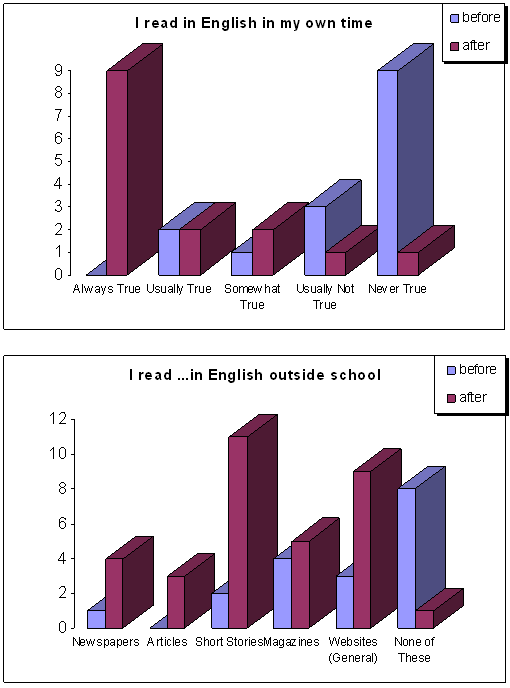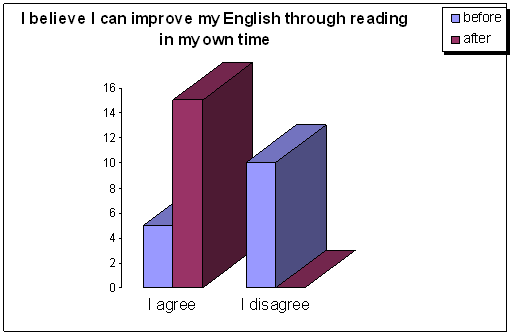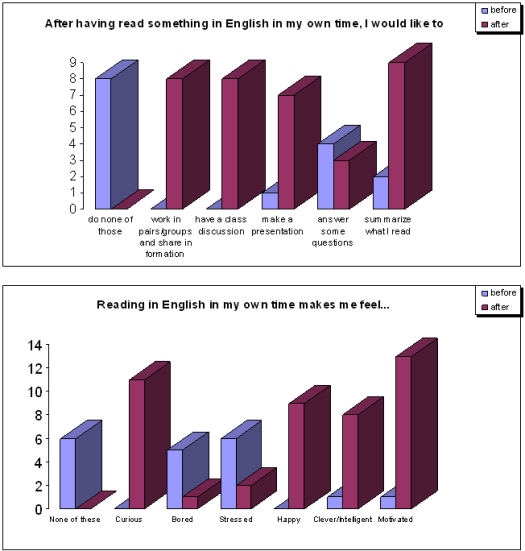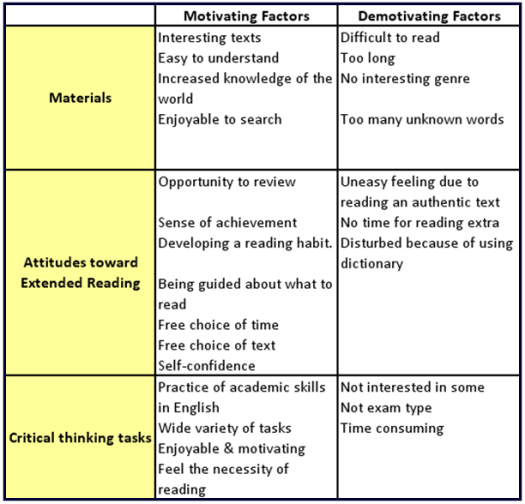A Fresh Look: “Task-based Extended Reading”
Burçin Yıldız,Turkey
Burçin Yıldız has been working as an EAP at Izmir University of Economics, Turkey for two years. She is doing her MA in Curriculum and Instruction. She has also worked at Bilkent University where she gained the Cambridge ESOL ICELT Certificate. She has taken part in a number of European Commission projects, most recently “Effective ways of using technology in to attain a higher level of knowledge of a foreign language” in Prague. She has also given presentations on such ELT as “Motivating the Unmotivated” and “Task-based Extended Reading”. She is currently interested in research on curriculum and critical thinking.
E-mail: burcinyildiz35@gmail.com
Menu
Introduction
Background to the study and defining the problem
Method
Tasks
Limitations
Data analysis and results
Discussion
Conclusion and recommendations
References
Extensive reading (ER) has been regarded as a significant component of second or foreign language programmes for many years. While there are a variety of definitions concerning ER, it is commonly defined as “learners reading a variety of easy, enjoyable books” (Helgesen, 2005), referring to the concept of graded reading. As Day and Bamford also suggest the purposes of reading are usually related to pleasure, information and general understanding(1998, p.7-8). Additionally, Grabe and Stoller (2002) describe the ER as “an approach to the teaching and learning of reading in which learners read large quantities of material that is within their linguistic competence” (p.259). This implicitly refers to Krashen’s (1982) Input Hypothesis, currently the basis of many ER programs. In theory, this suggests that students are to read materials that are a little beyond their reading skill levels. Moreover,Hafiz and Tudor (1989) consider ER as “the reading of large amounts of material in the second language over time for personal pleasure or interest, and without the addition of productive tasks or follow up language work” (p.4). On the other hand, with such approaches the value of the tasks assigned along with ER texts and their positive impact on motivation appear to be disregarded by most scholars. Hence, the nature and role of ER need to be closely re-examined so as to discover its promising contribution to learners’ progress in English for Academic Purposes (EAP) context. To expand the existing role - reading pleasurably- into a more structured and student centered one, I feel that a “Task-based Extended Reading Approach” should be adopted. Task-based Extended Reading is premised upon the idea of learners’ engagement in reading a variety of academic genres extensively in parallel with the objectives of the school curriculum and themes in course books in order for learners to actively participate in some certain tasks in class. Through the implementation of such a programme my ultimate expectation was to equip my learners with multiple opportunities for active participation in various, theme-based tasks as autonomous learners. Therefore, this study was designed to shed light on the following question:
How does a Task-based Extended Reading programme, which requires critical thinking skills, affect learners’ motivation?
This study was conducted at Izmir University of Economics School of Foreign Languages, which is an Englishas a Foreign Language (EFL) environment. The overall aim of the English Programme is to prepare learners for their academic study using a communicative approach as well as promote independent learning by encouraging learners to become motivated and active language learners. There are six seven-week modules in an academic year. As the medium of instruction is English, learners are to take some examinations if they get below 74.50 points in the Placement Test and get below 64.50 points in the Proficiency in English Exam (PIE) they have to attend the English Preparatory Programme. They are placed at different levels according to their level of proficiency. The learners who were the subjects of this research were attending the Elementary (B) course, which aims to assist learners with acquiring certain academic skills such as reading, listening, speaking and writing. Ways to improve these skills have been widely explored and experimented in this context. As ER has been reported to enhance learners’ affective domain, such as motivation and attitude to read (Cho & Krashen, 1994; Manson & Krashen, 1997), an ER programme is being implemented in my institution. In this programme, learners are expected to read outside the classroom; however, considering the current motivation of the learners, I have observed the following restrictions on the existing ER programme:
-
is not structured and controlled,
-
lacks any follow-up tasksrequiring thinking skills,
-
lacks active participation of learners,
-
does not have a theme-based approach,
-
does not promote learner autonomy in terms of choosing reading materials,
-
does not provide learners with clear expectations and learning outcomes.
Given these restrictions affecting my learners’ motivation negatively, as an educator I felt the need to explore their expectations, beliefs and attitudes concerning Extended Reading. Thus, I chose an action research through which I desired to investigate how integration of Task-based Extended Reading affects learners’ motivation.
-
Participants and settings
An elementary class of 15 students was involved in the research. It was the third module in the 2009-2010 academic year and students were repeating the same level for the third time. That does not only indicate their weakness in academic skills in English but also their lack of motivation, interest and sense of success. Considering the general profile of the students, the majority of those to take part in the research had a tendency not to read extensively in their leisure time unless they were encouraged to do so. In parallel with this, their motivation towards Extended Reading was also quite low.
-
Research instruments and data collection
Action research inquires a triangulation of evidence to validate a researcher’s claim (Winter, 1989); thus, I used a range of instruments to collect data including a questionnaire, individual meetings, focus group discussions (FGDs) and teacher journals/notes. A questionnaire was administered to learners twice in order to investigate their motivation through identifying their expectations, beliefs and attitudes towards the use of Task-based Extended Reading before the implementation of the programme as well as the changes after the implementation process in their own academic context. This questionnaire composed six questions which ask participants to tick statements regarding their expectations, attitudes and perspectives on this issue. In addition, each participant shared their personal expectations about Task-based Extended Reading in individual meetings in order for me to set realistic goals to be achieved throughout the programme and the data gathered was also recorded in my journal. To increase the reliability of the data collected through the questionnaires, some subjects were asked to participate in two FGDs, which were recorded. Furthermore, with the aim of carrying out a more structured research and referring back to more accurate information about the process, I used weekly journals and notes including the steps to be followed and the points to be considered about the implementation of Task-based Extended Reading programme.
In Task-based Extended Reading programme, I planned a list of theme-based tasks promoting critical thinking (see App. 1), one of the most widely discussed concepts in education these days. Elder and Paul (1994) suggest that critical thinking is the ability of thinkers to take charge of their own thinking and develop sound criteria and standards for analyzing and assessing their own thinking. Additionally, Maiorana (1992) stresses that the purpose of critical thinking is to achieve understanding, evaluate viewpoints, and solve problems. These definitions emphasize the significance of critical thinking skills in an EAP context which requires learners to be able to attain English language competence in cause and effect, description, categorization, and differentiation, specifically for comparison and contrast. As critical thinking is an ongoing process in which all language learners must engage, regardless of their language proficiency levels, I designed the tasks according to the themes in the course book. One of the reasons for this interest in developing theme-based language instruction is the theory that language acquisition is based on input that is meaningful and understandable to the learner (Krashen, 1985a, 1985b). Input must be comprehensible to the learner and be offered in such a way as to allow multiple opportunities to understand and use the language. As a result, instead of just letting learners read whatever they want, they were provided with a reading list scheduled according to the themes in the course book and tasks promoting higher order learning skills which in turn enable students to reach higher levels of language proficiency. The learners completed the tasks individually, in pairs or groups using the resources that they had as I monitored and offered encouragement. They spent valuable time communicating during the activities which were both enjoyable and motivating.
A number of significant limitations to the research findings need to be highlighted. To begin with, as all the learners were repeating the elementary level for the third time in this module, exam pressure posed an obstacle. They needed to pass the level exam which made them exam oriented since these exams measure only discrete skills, neglecting consideration of learners’ attitudes toward reading. Thus, they were inclined to view reading materials without exam type questions as fruitless school experiences. Therefore, the objectives of the programme were to be presented to them and the rationale behind the assigned tasks was to be stated clearly.
Another limitation was experienced through the implementation of the questionnaire. Since learners might have considered their reading experiences in their mother tongue while filling in the questionnaire, their responses might have been affected by their reading habits in L1, which might have led to misleading results in the analysis of the data. In order to deal with such a problem, I needed to guide them to think about their reading habits in the target language as well as conducting it in their mother tongue to make them feel confident while expressing themselves.
The items in the questionnaire were evaluated separately. The response to each question together with the recorded FGDs data was closely examined and some generalizations were drawn. Moreover, some striking information obtained through the weekly teacher journals/notes and the individual meetings was listed in a table and discussed throughout the research.
The graphs below show the results of the questionnaires administered to the students before and after the Task-based Extended Reading programme took place. The blue bars show the results prior to the commencement of the research and the purple bars show the results after the research had been conducted.




Table 1 shows the results of individual interviews and FGDs. This indicates that the motivation to read or not to read was multi-dimensional and varied among each participant. Eliminating some of the demotivating factors resulted in a tremendous increase in the amount of reading.
Table 1. Motivating & Demotivating Factors for Task-based Extended Reading

The results suggest that a Task-based Extended Reading programme has positively changed the learners’ attitudes towards reading outside the classroom in a foreign language. As materials and attitudes are the key components of motivation in reading and help learners see reading as a valuable source of information (Day and Bamford, 1998, pp. 27-29), the design and the selection of Extended Reading materials to be included in the programme are of great significance. Therefore, a variety of reading tasks selected for a Task-based Extended Reading programme should be based on thinking skills such as critical thinking, creative thinking and problem solving since creative tasks, which provide the learners with a degree of freedom in their resolution can be a source of personal pride and intrinsic motivation (Kellaghan, Madaus, and Raczek, 1996). Consequently, through the implementation of such a programme my learners were provided with multiple opportunities to participate actively in various, theme-based tasks as autonomous learners, which led to an increase in their motivation towards reading outside.
The beneficial effects of ER have been investigated by numerous studies; however, this research focused more specifically on Task-based Extended Reading. It can be seen that it requires learners’ engagement in reading a variety of academic genres extensively in parallel with the objectives of the school curriculum and themes in the course book for learners to actively participate in tasks demanding critical thinking. As the assigned reading texts were thematically related to the units in the course book, learners had the opportunity both to review what was covered in the classroom and to expand their knowledge about this issue, which led to an increase in the motivation to read. Besides the affective benefits of Task-based Extended Reading, it also provided the learners with overall gains in language learning so success in reading and its associated skills, most notably writing, made the learners come to enjoy language learning and value their study of English. Therefore, despite requiring a significant investment in time, energy and resources, the benefits in terms of the increased motivation in my learners far outweigh the modest sacrifices required. To conclude, the inclusion of Task-based Extended Reading as a component of an EAP programme was positively received by the learners and created positive attitudes towards reading. It can, therefore, be argued that for an ER programme to be successful, learners must be involved in a Task-based Extended Reading programme requiring learners to be involved in a variety of tasks demanding critical thinking. Additionally, this programme can be integrated into the school curriculum considering the significance of the tasks being in parallel with the objectives of the curriculum and themes in course books.
Bamford, J. and Day, R. R. (1998). The Characteristics of an Extensive Reading Approach. Cambridge: Cambridge University Press.
Cho, K., & Krashen, S. (1994). Acquisition of vocabulary from the Sweet Valley Kids series: Adult English acquisition. Journal of Reading, 37(8), 662-667.
Day, R.R. & Bamford, J. (1998). Extensive reading in the second language classroom. New York: Cambridge UP.
Elder, L. & Paul, R. (1994). Critical thinking: Why we must transform our teaching. Journal of Developmental Education, 18(1), 34-35.
Grabe, W. & F. Stoller (2002) Teaching and researching reading. Pearson Education. New
York.
Hafiz, F.M. & Tudor, I. (1989). Extensive reading and the development of language skills.
ELT Journal, 34(1), 5-13.
Helgesen, M. (2005). Extensive reading, effective reading. Paper presented at the meeting of Teachers of English to Speakers of Other Languages (San Antonio, Texas, USA, April, 2005).
Kellaghan, T., Madaus, G. F., Raczek, A. (1996). The use of external examinations to improve student motivation. Washington, D.C.: American Educational Research Association.
Krashen, S. D. (1985a). Input in second language acquisition. Oxford, U.K.: Pergamon Press.
Krashen, S. D. (1985b). The input hypothesis: Issues and implications. New York: Longman Press.
Krashen, S. D. (1988). Do we learn to read by reading? The relationship between free reading and reading ability. In D. Tannen (Ed.) Linguistics in Context (pp. 269-298). Norwood, NJ: Ablex
Maiorana, V. P. (1992). Critical thinking across the curriculum: Building the analytical classroom. (ERIC Document Reproduction Service No. ED 347511).
Manson, B, & Krashen, S. (1997). Extensive reading in English as a foreign language. System, 25(1), 91-102.
Winter, R., (1989), Learning from Experience, England: Falmer Press.

Please check the Teaching Advanced Students course at Pilgrims website.


|